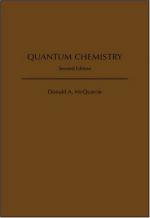|
This section contains 1,685 words (approx. 6 pages at 300 words per page) |

|
Quantum chemistry involves the application of the principles of quantum theory to chemistry.
Quantum chemistry helps predict the way atoms combine to form molecules, and the way molecules interact with each other. Applications of quantum chemistry include the calculation of molecular structures, prediction of properties, analysis of spectroscopic data, and the description of chemical reactions in terms of individual molecular events.
Quantum theory states that energy is transferred between systems in discrete amounts. The theory arose from the inability of classical physics to adequately explain certain physical phenomena, such as blackbody radiation and the photoelectric effect. To account for these phenomena, the concept of quantization was introduced in 1901 by the German physicist Max Planck.
Planck devised his quantum hypothesis while studying blackbody radiation. The term perfect blackbody applies to bodies that act as perfect radiators or absorbers of heat. Although there are no known perfect blackbodies...
|
This section contains 1,685 words (approx. 6 pages at 300 words per page) |

|


